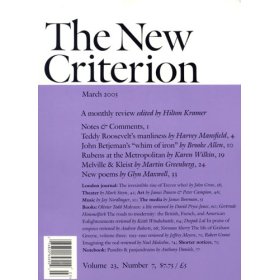Many happy returns...

The New Criterion at 25:
To celebrate The New Criterion’s silver jubilee, Ivan R. Dee will publish an anthology of the most definitive articles that the journal has published in the last quarter century. This reflection on twenty-five years of high culture and fine arts will be available for sale in the spring of 2007.
Issue 1, Volume 1: September 1982. The issue opens with the following editorial statement:
A multitude of journals of every size and periodicity—quarterlies, monthlies, fortnightlies, weeklies, and even the daily papers to the extent that they concern themselves with matters of the mind—lavishes upon the life of culture a vast amount of attention. Yet most of what is written in these journals is either hopelessly ignorant, deliberately obscurantist, commercially compromised, or politically motivated. Especially where the fine arts and the disciplines of high culture are concerned, criticism at every level—from the daily newspaper review of a concert or a novel to the disquisition of critics and scholars in learned journals—has almost everywhere degenerated into one of another form of ideology or publicity or some pernicious combination of the two. As a result, the very notion of an independent high culture and the distinctions that separate it from popular culture and commercial entertainment have been radically eroded. Far from resisting erosion, criticism has lately been responsible for hastening it on its downward course. Not only have our critics assisted in blurring the kinds of distinctions that were once fundamental to their vocation, in many cases they have openly celebrated the demise of such distinctions. . .A very large part of the reason for this sad state of affairs is, frankly, political. We are still living in the aftermath of the insidious assault on mind that was one of the most repulsive features of the radical movement of the Sixties. The cultural consequences of this leftward turn in our political life have been far graver than is commonly supposed. In everything from the writing of textbooks to the reviewing of trade books, form the introduction of kitsch into the museums to the decline of literacy in schools to the corruption of scholarly research, the effect on the life of culture has been ongoing and catastrophic…The cultural landscape is littered with its casualties and debris.
The time has surely come for criticism to turn its back on this intellectual vaudeville act, which wears a fancy radical face when performing for the public while at the same time—backstage, as it were—availing itself of all the advantages and preferments that our society offers in such abundance. It is time to apply a new criterion to the discussion of cultural life—a criterion of truth.
<< Home